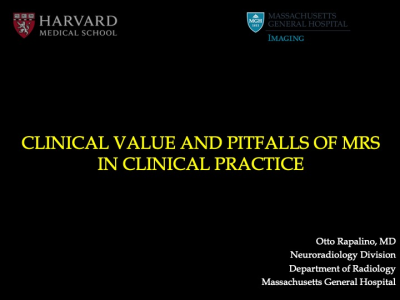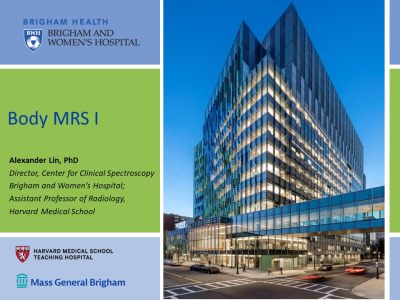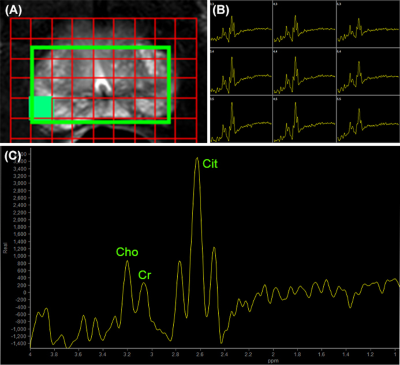Weekend Course
Steady-State MRS
Joint Annual Meeting ISMRM-ESMRMB & ISMRT 31st Annual Meeting • 07-12 May 2022 • London, UK

| Advanced MRS I (Ultra-High Field & Resolution) | |||
| 12:30 | MRS Beyond 7T
Jannie Wijnen
This educational lecture covers the advantages and pitfalls of Magnetic Resonance Spectroscopy at high magnetic field. Learning goals:
|
||
| 12:55 | Ultra-High Resolution MRSI
Eva Niess
MR spectroscopic imaging enables mapping of spatial distribution of multiple low-concentration metabolites simultaneously. The detection of pathology-induced, altered brain metabolism has great potential in clinical research or diagnosis. High- and ultra-high-field MR systems opened new possibilities for MRSI acquisition with substantially improved spatial resolution, which historically hampered the clinical utility of MRSI. This lecture overviews fast encoding techniques, with which ultra-high-resolution 2D-/3D-MRSI has been achieved so far, as well as their first applications in basic research and clinical studies.
|
||
| Advanced MRS II (Function) | |||
| 13:20 | Is Editing Ready for the Clinics?
Georg Oeltzschner
Spectral-edited MRS can improve the resolution of coupled signals from low-concentration metabolites, for example GABA, glutathione, lactate, and 2-hydroxyglutarate. These compounds are involved in multiple physiological processes, and their improved detection allows for exciting clinical applications in neurology, psychiatry, and oncology. However, spectral editing is also very sensitive to experimental instabilities and requires great attention to detail during acquisition, data processing, and spectral modeling. This lecture provides a brief introduction to J-difference editing, presents the most promising clinical applications, and discusses the roadblocks on the way to everyday use of spectral edited MRS in a clinical context.
|
||
| 13:45 | Potential of fMRS Video Permission Withheld
Assaf Tal
|
||
| 14:10 | Break & Meet the Teachers |
||
| Artificial Intelligence & Personalized Medicine | |||
| 15:25 |  |
Highlighting the Diagnostic Value of MRS in Clinical Practice
Otto Rapalino
MR spectroscopy is an important diagnostic MR imaging modality with an exceptional diagnostic value, but its clinical value is often underestimated. This presentation will present an overview of the current clinical applications, potential pitfalls, and multiple examples illustrating the significant clinical value of MR spectroscopy.
|
|
| Body MRS | |||
| 14:35 |  |
Body MRS I
Alexander Lin
Body spectroscopy comprises the majority of the use of MR spectroscopy in clinical trials. The goal of this presentation is to provide an overview of the various uses of both proton (1H) and phosphorous (31P) MRS in the liver, muscle, heart, breast, and kidney. For each region, examples of clinical uses will be shown and the primary MRS biomarkers will be described. Technical challenges for each region of the body will also be described. While more advanced methodologies need to be employed, the clinical value of body MRS is clearly evident.
|
|
| 15:00 |  |
Body MRS-II: MR Spectroscopic Imaging (MRSI) of Prostate Cancer Video Permission Withheld
Naranamangalam Jagannathan
Early diagnosis of prostate cancer is essential and MRI and MR spectroscopic imaging (MRSI) together with scoring by Prostate Imaging Reporting and Data System is used for diagnosis. Both 1.5- and 3-Tesla are widely used. MEGA pulse for simultaneous suppression of lipid and water is incorporated into PRESS localization sequence along with outer volume suppression for obtaining MRSI. It gives spectra from voxels covering whole prostate enabling assessment of tissue heterogeneity. MRSI is used for detection, localization, staging, risk stratification and surveillance and direct targeting biopsies. This talk would cover the MRSI methodology along with the challenges and the solutions.
|
|
| Artificial Intelligence & Personalized Medicine | |||
| 15:50 | How Can AI Help for MRS?
Esin Ozturk-Isik
Magnetic resonance spectroscopic imaging (MRS/I) has benefited from the advances in the machine learning field. This talk will summarize recent MRSI studies that have used machine learning for data acquisition and reconstruction, preprocessing, super-resolution, quality control, denoising, and spectral quantification, in addition to molecular subtyping of the brain tumors.
|
||
The International Society for Magnetic Resonance in Medicine is accredited by the Accreditation Council for Continuing Medical Education to provide continuing medical education for physicians.